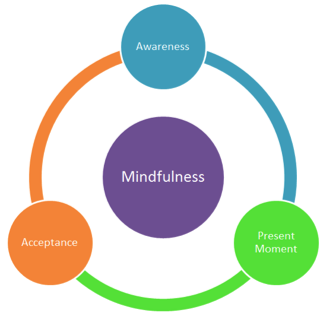The power of mindfulness – for patients and for you
We have known since ancient times that the way we think and the way we handle our emotions play a big part in our mental health, both from the patient perspective and indeed within our profession in general practice.
The latest statistics indicate that 1 in 4 adults will experience a mental or emotional health problem at some point in their lifetime. With thousands of GPs facing tougher working conditions and dissolving morale now more than ever, our profession is in need of resilience and techniques to avoid burnout and to continue to feel impassioned by our work.
Marcus Aurelius and Shakespeare both observed that the way we see something determines its impact on us. For decades, Cognitive Behavioural Therapy (CBT) has been seen as the leading treatment for anxiety and depression, with mental health services and the government investing in this form of therapy and increasing access to psychological therapies (IAPT) in primary care.
In our lives as GPs, many of my colleagues and fellow locums use other techniques to modify their thoughts leading to positive emotions and an enhanced well-being. Methods include exercise, meditation, contact with nature, music, philosophy or faith. The truth is all these methods in various combinations can help with mental health depending on the individual.
There is scientific evidence that meditation, especially when associated with some other mental disciplines derived from CBT, can improve our mental and physical health. This has given rise to a new group of psychological therapies called mindfulness-based therapies. We are seeing not only the return of ancient wisdom, but its combined use with modern psychological therapies to treat common mental health problems. It can tackle recurrent depression, but the principles have a much wider application to our lives. The use of mindfulness in the workplace can improve productivity and decrease sickness absence.
5 facts of mindfulness and why it should matter to you:
- Mindfulness-based Cognitive Therapy (MBCT) has achieved significant reduction in relapse rates among people with recurrent depression. MBCT has also been shown to reduce insomnia among patients with anxiety disorders, and improve anxiety and mood symptoms in people with generalised anxiety disorder (GAD). It has been found beneficial to people with bipolar disorder at high risk of suicide, and has achieved long-term reduction in depression in older people. MBCT has also shown potential for treating patients with chronic fatigue syndrome. Further research suggests that few of the people who might benefit are currently being offered mindfulness courses, despite the recommendation by the National Institute for Health and Clinical (NICE) of the use of MBCT for people at risk of repeated relapse into depression.
- Mindfulness-based Stress Reduction (MBSR) has been shown to reduce stress and mood disturbance, improve mood regulation, and increase perceptions of control in people with long-term anxiety disorders. MBSR participants with mood disorders have also shown reduced negative thinking and less stress and mood disturbance symptoms. Participants in MBSR workplace programmes report being more engaged in their work, more energised and less anxious after the course, and also decreased medical symptoms and psychological distress. People who have taken an MBSR programme also show a greater ability to concentrate than do controls. MBSR has also demonstrated reductions in the severity of psychiatric and medical symptoms, and a substantial reduction in use of GP services. Participants in MBSR have reported less depression, anxiety and overall psychological distress. Prison inmates in one study reported significantly reduced levels of hostility and mood disturbance after MBSR, and increased self-esteem. Patients with chronic pain attending MBSR courses report less pain, reduced use of medication, and feeling less anxious and depressed. MBSR has also been shown to improve mood and reduce stress symptoms 6 among people receiving treatment for cancer, as well as improve sleep and alleviate physiological and psychological symptoms of stress. It has also been found to reduce pain, lessen use of medication, and improve energy levels and quality of life in general. HIV positive patients attending an MBSR programme reported significant improvements in quality of life and less psychological distress, as well as better immune system functioning, compared with controls. MBSR has also been associated with improvements in patients with psoriasis, fibromyalgia and chronic fatigue syndrome.
- Acceptance and Commitment Therapy (ACT) has been found helpful for drug abuse, psychosis, chronic pain, depression and eating disorders. It can reduce hospital admissions among people with psychosis and self-harm, and improves emotional balance and mental health in people with borderline personality disorder. ACT has also been found to reduce use of medical services and sick leave among adults at risk of long-term disability. ACT training in the workplace can improve mental health, reduce depression and improve creativity.
- Dialectical Behaviour Therapy (DBT) has been shown to improve behavioural self-management (less self-harm and drug abuse and fewer suicide attempts) among women with borderline personality disorder, and reduce hospital admissions. It can also reduce distress and anger among people with borderline personality disorder and improve social adjustment and overall mental health. DBT trials for bulimia nervosa and for binge eating have also yielded promising results. DBT has also been found to reduce symptoms in depressed patients who were not helped by antidepressants, as well as in chronically depressed older adults. Mindfulness and the brain Neuroscientific studies have found differences in the areas of the brain associated with decision-making, attention and awareness in people who regularly practise Mindfulness meditation. People undertaking Mindfulness training have also shown an increase in activation in the left pre-frontal cortex, an area of the brain associated with positive emotions that is generally less active in people who are depressed. Regular meditation also results in increased brain size in areas linked to emotion regulation, such as the hippocampus, the orbito-frontal cortex, the thalamus and the inferior temporal lobe.
- Mindfulness and well-being research suggests that Mindfulness confers significant benefits for health and well-being and quality of life in general. People who are more mindful are less likely to experience psychological distress, including depression and anxiety. They are less neurotic, more extroverted and report greater well-being and life satisfaction. People who are more mindful have greater awareness, understanding and acceptance of their emotions, and recover from bad moods more quickly. More mindful people have less frequent negative thoughts and are more able to let them go when they arise. They have higher, more stable self-esteem that is less dependent on external factors. More mindful people enjoy more satisfying relationships, are better at communicating, and are less troubled by relationship conflict, as well as less likely to think negatively of their partners as a result of conflict. Mindfulness is correlated with emotional intelligence, which itself has been associated with good social skills, ability to cooperate and ability to see another person’s perspective. People who are mindful are also less likely to react defensively or aggressively when they feel threatened. Mindfulness seems to increase self-awareness, and is associated with greater vitality. Being more mindful is also linked with reaching academic and personal goals. Practising meditation has repeatedly been shown to improve people’s attention, as well as improve job performance, productivity and satisfaction, and to enable better relationships with colleagues resulting in a reduction of work-related stress. People who are mindful feel more in control of their behaviour and are more able to override or change internal thoughts and feelings and resist acting on impulse. Meditation practices more generally have been shown to increase blood flow, reduce blood pressure and protect people at risk of developing hypertension, as well as reduce the risk of developing and dying from cardiovascular disease, and to reduce its severity. People who meditate have fewer hospital admissions for heart disease, cancer and infectious diseases, and visit their doctor half as often compared to people who don’t meditate. Mindfulness can also reduce addictive behaviour, and meditation practices generally have been found to help reduce use of illegal drugs, prescribed medication, alcohol and caffeine.
Why is Mindfulness helpful?
- Greater insight. By taking a mindful perspective, we observe our experience but don’t get caught up in it. Mindfulness helps us get greater clarity on what is happening in our minds, and in our lives.
- Improved problem-solving. By slowing down and investigating our thoughts, feelings and experiences more carefully, we create space for coming up with wise responses to the difficulties in our lives. We create space between the urge to react and our actions themselves, and we can make considered and creative decisions about how to behave.
- Better attention. We can concentrate better on tasks, maintain our focus and reach goals. We are less distracted. Experience can become fresher, lighter, clearer, richer and more vivid.
- Less selfishness. We are less wrapped up in our own thoughts and feelings and so have greater ability to take others into account. We can be more considerate, empathic, compassionate, sensitive and flexible in our relationships
- Less neurosis. We experience the world in an open way that is not so weighed down by unhelpful psychological patterns. We are better attuned to ourselves, to others, and to the world, and able to act more skilfully, based on present need, rather than past conditioning.
- More acceptance. Through Mindfulness, we see that events, thoughts and feelings always change, and we can learn to bear experiences more lightly, and let them go. We are more able to enjoy wellbeing that does not depend on things going “right”.
- Greater enjoyment of life. We can become more aware of pleasant experiences that were previously unnoticed because of our mental focus on the past and the future.
- Less “beating ourselves up”. Mindfulness reduces our identification with negative thinking pattern. We stop thinking we are our thoughts, and we can be kind to ourselves when we have negative thoughts about ourselves; and
- Better mind and body integration. Many of us have a tendency to live “in our heads” and ignore what is happening in our bodies. Mindfulness makes us more aware of what is happening both in our bodies and in our minds, so we can experience and take into account the full range of our thoughts as well as our feelings.
The Mental Health Foundation commissioned a survey asking GPs about their thoughts on Mindfulness. 64% of GPs think it would be helpful for them to receive training in Mindfulness skills themselves. The findings provided clear evidence that GPs were generally very positive towards Mindfulness as a health intervention, but rarely if they ever refer patients to MBCT courses because courses are not widely available.
Network Locum (now Lantum) wish to support our locum community and GP colleagues by hosting a CPD event on 13th May 2015, where Dr Cinzia Pezzolesi Mindfullness psychotherapist will deliver a talk on how GPs can use Mindfulness within the consultation, how to signpost patients and also how we can use this technique for ourselves. We will also have Dr Daniel Dietch a GP with an interest in mental health providing the latest updates in primary care and answering the FAQs posted in Melissa and Will’s Locum GP Facebook group, so do post more questions for our panel of experts on there.
You can grab your tickets for the 'The Head' in General Practice: neurology, mental health, and mindfulness' CPD event here: http://www.eventbrite.co.uk/e/the-head-in-general-practice-neurology-mental-health-and-mindfulness-tickets-16519134175
Dr Ishani Patel
GP Ambassador, Network Locum (now Lantum)
Reference
http://www.livingmindfully.co.uk/downloads/Mindfulness_Report.pdf




